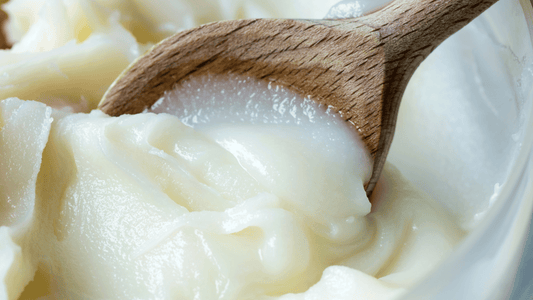
Is Beef Tallow Good For Eczema?
Share
Exploring Is Beef Tallow Good For Eczema?
Eczema, a chronic skin condition characterized by itchy, inflamed, and dry skin, affects millions worldwide. Those who live with it often search for natural remedies to soothe symptoms and improve skin health. Among the many options, beef tallow has emerged as a topic of interest in skincare communities. But is beef tallow good for eczema? This blog post dives into the science, benefits, and considerations of using beef tallow for eczema, offering insights for those seeking alternative skincare solutions. For premium tallow-based skincare products, visit Phat Skin Co..
Understanding Eczema and Its Challenges
Eczema, or atopic dermatitis, manifests as red, scaly patches that can be intensely itchy. Triggers include stress, allergens, environmental factors, and harsh chemicals in skincare products. The condition often results from a compromised skin barrier, which struggles to retain moisture and protect against irritants. Traditional treatments like corticosteroids and moisturizers help, but some individuals prefer natural alternatives to avoid potential side effects.
This is where beef tallow enters the conversation. Derived from rendered beef fat, tallow has been used for centuries in skincare for its nourishing properties. Its resurgence in modern skincare prompts the question: is beef tallow good for eczema? To answer, we need to explore its composition and how it interacts with eczematous skin.
What Is Beef Tallow?
Beef tallow is a rendered form of fat from cattle, typically sourced from the suet around the kidneys or other fatty tissues. The rendering process purifies the fat, resulting in a stable, nutrient-rich substance. Tallow is rich in vitamins A, D, E, and K, as well as essential fatty acids like stearic and oleic acid. These components mirror the lipids found in human skin, making tallow a potentially compatible moisturizer.
Unlike synthetic emollients, tallow is minimally processed and free from artificial fragrances or preservatives, which can irritate sensitive skin. Its similarity to the skin’s natural sebum has led to claims that it can repair and strengthen the skin barrier, a key factor in managing eczema. But is beef tallow good for eczema in practice? Let’s examine its potential benefits.
Is Beef Tallow Good For Eczema?: Potential Benefits
Beef tallow’s composition offers several properties that may benefit eczema-prone skin:
-
Deep Moisturization: Tallow’s fatty acids, particularly oleic and stearic acid, penetrate the skin to provide long-lasting hydration. For eczema sufferers, maintaining moisture is critical to preventing flare-ups and reducing itchiness.
-
Skin Barrier Support: The lipids in tallow mimic the skin’s natural barrier, potentially aiding in its repair. A stronger barrier helps lock in moisture and protect against irritants, addressing a core issue in eczema.
-
Nutrient-Rich Profile: Vitamins A, D, and E in tallow have anti-inflammatory and antioxidant properties. These may soothe inflamed skin and promote healing, reducing the severity of eczema symptoms.
-
Hypoallergenic Nature: Because tallow is a single-ingredient product, it lacks the additives found in many commercial creams that can trigger eczema flares. This simplicity makes it a gentle option for sensitive skin.
-
Anti-Inflammatory Effects: The conjugated linoleic acid (CLA) in grass-fed tallow may reduce inflammation, a key driver of eczema symptoms.
These benefits suggest that is beef tallow good for eczema may have a positive answer, especially for those seeking natural remedies. Products from Phat Skin Co. harness these properties, offering tallow-based solutions crafted for sensitive skin.
Is Beef Tallow Good For Eczema?: The Science
While anecdotal evidence abounds, scientific research on beef tallow for eczema is limited. However, studies on similar lipid-based moisturizers provide context. A 2014 study in the Journal of Clinical and Aesthetic Dermatology found that emollients with fatty acids improve skin barrier function in atopic dermatitis patients. Tallow’s lipid profile aligns with these findings, suggesting it could offer similar benefits.
Additionally, tallow’s vitamins have documented skin benefits. Vitamin A supports skin cell turnover, which may help with scaling in eczema, while vitamin E’s antioxidant properties can reduce oxidative stress in inflamed skin. Grass-fed tallow, in particular, contains higher levels of CLA, which has shown anti-inflammatory effects in animal studies.
However, eczema is highly individual. What works for one person may not for another, and factors like allergies to bovine products or improper application can affect outcomes. Consulting a dermatologist before incorporating tallow into your routine is wise, especially for severe cases.
How to Use Beef Tallow for Eczema
If you’re intrigued by the question is beef tallow good for eczema, proper application is key to maximizing benefits. Here’s how to integrate tallow into your skincare routine:
-
Choose High-Quality Tallow: Opt for grass-fed, organic tallow to ensure purity and nutrient density. Phat Skin Co. offers premium tallow products formulated for sensitive skin.
-
Patch Test First: Apply a small amount to a non-affected area to check for sensitivities, as some individuals may react to animal-derived products.
-
Apply to Damp Skin: After a lukewarm shower, gently pat skin dry and apply a thin layer of tallow. This locks in moisture and enhances absorption.
-
Use Sparingly: Tallow is highly concentrated, so a little goes a long way. Over-application can clog pores or feel greasy.
-
Combine with Other Care: Tallow can complement other eczema treatments, like oatmeal baths or hypoallergenic cleansers, but avoid mixing with products containing irritants.
Consistency is crucial. Regular use may yield improvements in skin texture and hydration over weeks, but monitor for any adverse reactions.
Is Beef Tallow Good For Eczema?: Considerations and Precautions
While beef tallow shows promise, it’s not a cure-all. Consider these factors before use:
-
Allergies: Those with beef or dairy allergies should avoid tallow, as it may trigger reactions.
-
Purity Matters: Low-quality tallow or products with additives can irritate eczema-prone skin. Stick to reputable sources like Phat Skin Co..
-
Not a Replacement for Medical Treatment: Severe eczema may require prescription medications. Tallow can be a complementary therapy but shouldn’t replace doctor-recommended treatments.
-
Texture and Scent: Tallow has a distinct texture and mild odor, which may not appeal to everyone. Some brands blend it with essential oils (use caution, as these can irritate).
-
Ethical Concerns: For vegans or those avoiding animal products, tallow may not align with personal values. Plant-based alternatives like shea butter are options.
Discussing tallow with a healthcare provider ensures it fits your specific needs and skin profile.
Alternatives to Beef Tallow for Eczema
If beef tallow isn’t suitable, other natural moisturizers may help manage eczema:
-
Shea Butter: Rich in vitamins and fatty acids, shea butter hydrates and soothes without animal-derived ingredients.
-
Coconut Oil: Its antimicrobial properties can reduce infection risk in scratched eczema patches, though it may be comedogenic for some.
-
Ceramide-Based Creams: These mimic the skin’s natural lipids, supporting barrier repair without animal products.
-
Aloe Vera: Known for its cooling and anti-inflammatory effects, aloe can calm irritated skin.
Exploring these options alongside tallow allows you to find the best fit for your skin. For those committed to tallow, Phat Skin Co. offers expertly crafted products to support your eczema journey.
Conclusion: Is Beef Tallow Good For Eczema?
The question is beef tallow good for eczema yields a promising but nuanced answer. Its moisturizing, nutrient-rich, and anti-inflammatory properties make it a compelling natural remedy for some eczema sufferers. By mimicking the skin’s natural lipids, tallow may strengthen the skin barrier, reduce dryness, and soothe inflammation. However, individual responses vary, and precautions like patch testing and choosing high-quality products are essential.
For those eager to try tallow, Phat Skin Co. provides premium tallow-based skincare designed with sensitive skin in mind. Whether you choose tallow or another remedy, managing eczema requires patience, consistency, and a tailored approach. Consult a dermatologist to create a plan that works for you, and explore natural options like tallow to complement your care.


